《综合英语》课程教学资源Ⅱ_48290_课程资源_综合英语Ⅱ_Unit 6_U6 Text analysis 课堂用
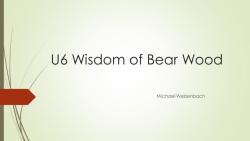
U6 Wisdom of Bear WoodMichaelWelzenbach
U6 Wisdom of Bear Wood Michael Welzenbach

Review1杰克的思绪猛地回到现在。2.新冠病毒引起的肺炎疫情波及了全国人民生活的各个领域。3.他在聚会上一直缠着我,我根本甩不掉他。4.妈妈变得越来越虚弱,不能一个人住了。5.他喜欢偷懒。6.前往罗马的乘客,请到32号登机口登机。7.我们会向我们的客人表示热烈的欢迎。8.如果你怀疑煤气泄漏,不要划火柴,甚至不要开电灯。9.他说我在擅闯私人士地
Review 1. 杰克的思绪猛地回到现在。 2. 新冠病毒引起的肺炎疫情波及了全国人民生活的各个领域。 3. 他在聚会上一直缠着我,我根本甩不掉他。 4. 妈妈变得越来越虚弱,不能一个人住了。 5. 他喜欢偷懒。 6. 前往罗马的乘客,请到32号登机口登机。 7. 我们会向我们的客人表示热烈的欢迎。 8. 如果你怀疑煤气泄漏,不要划火柴,甚至不要开电灯。 9. 他说我在擅闯私人土地
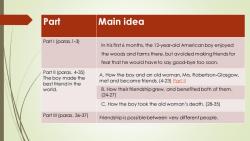
PartMain ideaPart 1 (paras.1-3)Inhisfirst6months,the12-year-oldAmericanboyenjoyedthe woodsandfarmsthere,butavoidedmakingfriendsforfearthat he would haveto saygood-bye too soon.Part Il (paras.4-35)A.Howtheboyandanoldwoman,Mrs.Robertson-GlasgowTheboymadethemetandbecamefriends.(4-23)PartlbestfriendintheB.How their friendshipgrew,and benefitedboth of them.world.(24-27)C.Howtheboytooktheoldwoman'sdeath.(28-35)Part IlI (paras. 36-37)Friendshipispossiblebetweenverydifferentpeople
Part Main idea Part I (paras.1-3) Part II (paras. 4-35) The boy made the best friend in the world. Part III (paras. 36-37) In his first 6 months, the 12-year-old American boy enjoyed the woods and farms there, but avoided making friends for fear that he would have to say good-bye too soon. A. How the boy and an old woman, Mrs. Robertson-Glasgow, met and became friends. (4-23) Part II B. How their friendshipgrew, and benefited both of them. (24-27) C. How the boy took the old woman’s death. (28-35) Friendship is possible between very different people
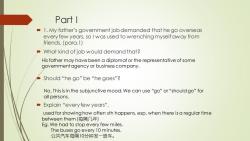
Part I1.Myfather'sgovernmentjobdemandedthathegooverseaseveryfewyears,soIwasusedtowrenchingmyselfawayfromfriends.(para.l)Whatkindofjobwoulddemandthat?Hisfathermayhavebeenadiplomatortherepresentativeofsomegovernmentagencyorbusinesscompany.Should"he go"be"hegoes"?No.Thisisinthe subjunctive mood.We canuse"go"or"shouldgo"forallpersons.Explain"everyfewyears".usedforshowinghowoftensthhappens,esp.whenthereisaregulartimebetweenthem(每隔几年)Eg.Wehadtostopeveryfewmiles.Thebusesgoeverylominutes.公共汽车每隔10分钟发一班车
Part I 1. My father’s government job demanded that he go overseas every few years, so I was used to wrenching myself away from friends. (para.1) What kind of job would demand that? Should “he go” be “he goes”? Explain “every few years”. His father may have been a diplomat or the representative of some government agency or business company. No. This is in the subjunctive mood. We can use “go” or “should go” for all persons. used for showing how often sth happens, esp. when there is a regular time between them (每隔几年) Eg. We had to stop every few miles. The buses go every 10 minutes. 公共汽车每隔10分钟发一班车
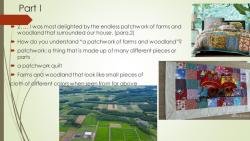
Part I...I wasmostdelightedbytheendlesspatchworkoffarmsandwoodlandthatsurroundedourhouse.(para.2)How doyouunderstand"a patchworkoffarms and woodland"?patchwork:athingthatismadeupofmanydifferentpiecesorpartsapatchworkquilt1Farmsapdwoodlandthatlooklikesmallpiecesofclothofdifferentcolorswhenseenfromfarabove
Part I 2. . I was most delighted by the endless patchwork of farms and woodland that surrounded our house. (para.2) How do you understand “a patchwork of farms and woodland”? patchwork: a thing that is made up of many different pieces or parts a patchwork quilt Farms and woodland that look like small pieces of cloth of different colors when seen from far above
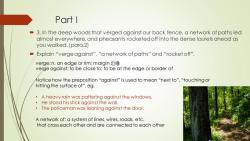
Part I3.Inthedeepwoodsthatvergedagainstourbackfence,anetworkofpathsledalmosteverywhere,andpheasantsrocketedoffintothedenselaurelsaheadasyouwalked.(para.2)Explain"vergeagainst","anetwork ofpaths"and"rocketoff"verge:n.anedgeorrim;margin边缘vergeagainst:tobecloseto;tobeattheedge orborderofNoticehowthepreposition"against"is usedtomean"nextto","touchingorhittingthesurfaceof",eg.Aheavyrainwaspatteringagainstthewindows.Hestoodhisstickagainstthewall.Thepolicemanwasleaningagainstthedoor.Anetwork of:asystemof lines,wires,roads,etc.thatcrosseachotherandareconnectedtoeachother
Part I 3. In the deep woods that verged against our back fence, a network of paths led almost everywhere, and pheasants rocketed off into the dense laurels ahead as you walked. (para.2) Explain “verge against”, “a network of paths” and “rocket off”. verge: n. an edge or rim; margin 边缘 verge against: to be close to; to be at the edge or border of Notice how the preposition “against” is used to mean “next to”, “touching or hitting the surface of”, eg. • A heavy rain was pattering against the windows. • He stood his stick against the wall. • The policeman was leaning against the door. A network of: a system of lines, wires, roads, etc. that cross each other and are connected to each other
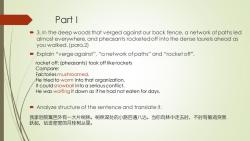
Part I3.Inthedeepwoodsthatvergedagainstourbackfence,anetworkofpathsledalmosteverywhere,andpheasantsrocketedoffintothedenselaurelsaheadasyouwalked.(para.2)Explain"vergeagainst","anetworkofpaths"and"rocketoff"rocketoff:(pheasants)tookofflikerocketsCompare:FdctoriesmushroomedHetriedto wormintothatorganization.ItcouldsnowballintoaseriousconflictHewaswolfingitdownasifhehadnoteatenfordays.Analyzestructureofthesentenceandtranslateit我家后院篱芭外有一大片树林。树林深处的小路四通八达。当你向林中走去时,不时有雉鸡突然跃起,钻进密密的月桂树丛里
Part I 3. In the deep woods that verged against our back fence, a network of paths led almost everywhere, and pheasants rocketed off into the dense laurels ahead as you walked. (para.2) Explain “verge against”, “a network of paths” and “rocket off”. Analyze structure of the sentence and translate it. rocket off: (pheasants) took off like rockets Compare: Factories mushroomed. He tried to worm into that organization. It could snowball into a serious conflict. He was wolfingit down as if he had not eaten for days. 我家后院篱笆外有一大片树林。树林深处的小路四通八达。当你向林中走去时,不时有雉鸡突然 跃起,钻进密密的月桂树丛里

Part I4.Ispentmostofmytimeroamingthewoodsandfieldsalone,playingRobinHood,daydreaming,collectingbugsandbird-watching.(para.3)Lookup“roam"inthedictionary.Compareitwith"roamabout"inpara.4and"walk"inpara.17roam:normallyanintransitiveverb,towalkortravelandusu.withoutanyclearpurpose,eg.roamabouthisimmensepropertyroamfreelyonthelandSimilarly,"walkthefield"isanidiomaticuseof"walk"Othercommonexpressionsinwhich"walk"isusedasatransitiveverb:HewalkshisdogtwiceadayTherearenomorebusesatthishour.Let'swalkit.It'sdarkoutside.l'llwalkyouhome.Explain"playingRobinHood
Part I 4. I spent most of my time roaming the woods and fields alone, playing Robin Hood, daydreaming, collecting bugs and bird-watching. (para.3) Look up “roam” in the dictionary. Compare it with “roam about” in para.4 and “walk” in para.17. Explain “playing Robin Hood”. roam: normally an intransitive verb, to walk or travel and usu. without any clear purpose, eg. roam about his immense property, roam freely on the land Similarly, “walk the field” is an idiomatic use of “walk”. Other common expressions in which “walk” is used as a transitive verb: • He walks his dog twice a day. • There are no more buses at this hour. Let’s walk it. • It’s dark outside. I’ll walk you home
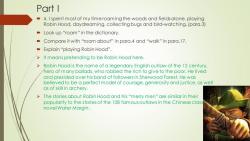
Part I4.Ispentmostofmytimeroamingthewoodsandfieldsalone,playingRobinHood,daydreaming,collectingbugsandbird-watching.(para.3)Lookup"roam"inthedictionary.Compareitwith"roamabout"inpara.4and"walk"inpara.17Explain"playingRobinHood"IfmeanspretendingtobeRobinHoodhereRobinHoodisthenameofalegendaryEnglishoutlawofthe12centuryheroofmanyballads,whorobbedtherichtogivetothepoor.HelivedandpresidedoverhisbandoffollowersinSherwoodForest.Hewasbelievedtobeaperfectmodelofcourage,generosityand justice,as wellasofskillinarchery.Thestoriesabout Robin Hoodandhis"merrymen"are similarin theirpopularitytothestoriesof the1o8famousoutlawsintheChineseclasnovelWaterMargin
Part I 4. I spent most of my time roaming the woods and fields alone, playing Robin Hood, daydreaming, collecting bugs and bird-watching. (para.3) Look up “roam” in the dictionary. Compare it with “roam about” in para.4 and “walk” in para.17. Explain “playing Robin Hood”. ➢ It means pretending to be Robin Hood here. ➢ Robin Hood is the name of a legendary English outlaw of the 12 century, hero of many ballads, who robbed the rich to give to the poor. He lived and presided over his band of followers in Sherwood Forest. He was believed to be a perfect model of courage, generosity and justice, as well as of skill in archery. ➢ The stories about Robin Hood and his “merry men” are similar in their popularity to the stories of the 108 famous outlaws in the Chinese classic novel Water Margin

Part I5.Keepingto myself was my wayofnot formingattachmentsthatIwouldonlyhaveto abandonthenexttimewemoved.(para.3)Paraphrase.I didnottrytomakemanyfriendsbecauseinthatwayldidnothaveto giveup myfriendshipthe next time Ihadtomove
Part I 5. Keeping to myself was my way of not forming attachments that I would only have to abandon the next time we moved. (para.3) Paraphrase. I did not try to make many friends because in that way I did not have to give up my friendship the next time I had to move
按次数下载不扣除下载券;
注册用户24小时内重复下载只扣除一次;
顺序:VIP每日次数-->可用次数-->下载券;
- 《综合英语》课程教学资源Ⅱ_48290_课程资源_综合英语Ⅱ_Unit 5_U5 warm-up& word study.ppt
- 《综合英语》课程教学资源Ⅱ_48290_课程资源_综合英语Ⅱ_Unit 5_U5 Structure and text analysis预习课件.ppt
- 《综合英语》课程教学资源Ⅱ_48290_课程资源_综合英语Ⅱ_Unit 5_U5 Structure and text analysis(课堂用).ppt
- 《综合英语》课程教学资源Ⅱ_48290_课程资源_综合英语Ⅱ_Unit 5_U5 Structure and text analysis预习课件2.ppt
- 《综合英语》课程教学资源Ⅱ_48290_课程资源_综合英语Ⅱ_Unit 5_U5 Structure and text analysis课堂用2.ppt
- 《综合英语》课程教学资源Ⅱ_48290_课程资源_综合英语Ⅱ_Unit 4_Background Information_Potomac air crash in 1982.ppt
- 《综合英语》课程教学资源Ⅱ_48290_课程资源_综合英语Ⅱ_Unit 4_Background Information_Washing DC:a city of form and rules.ppt
- 《综合英语》课程教学资源Ⅱ_48290_课程资源_综合英语Ⅱ_Unit 4_Background Information_Presidential monuments.ppt
- 《综合英语》课程教学资源Ⅱ_48290_课程资源_综合英语Ⅱ_Unit 4_Background Information_Washington Monument.ppt
- 《综合英语》课程教学资源Ⅱ_48290_课程资源_综合英语Ⅱ_Unit 4_U4 New words.ppt
- 《综合英语》课程教学资源Ⅱ_48290_课程资源_综合英语Ⅱ_Unit 4_U4 Q&A.ppt
- 《综合英语》课程教学资源Ⅱ_48290_课程资源_综合英语Ⅱ_Unit 4_U4 sentence patterns& complex sentences.ppt
- 《综合英语》课程教学资源Ⅱ_48290_课程资源_综合英语Ⅱ_Unit 2_民粹主义在美国的历史源流与现实走向_刘玲.pdf
- 《综合英语》课程教学资源Ⅱ_48290_课程资源_综合英语Ⅱ_Unit 2_Unit2 Q&A.ppt
- 《综合英语》课程教学资源Ⅱ_48290_课程资源_综合英语Ⅱ_Unit 2_U2 New words.ppt
- 《综合英语》课程教学资源Ⅱ_48290_课程资源_综合英语Ⅱ_Unit 1_课文文本_Unit1 Another School Year——-What For?.pdf
- 《综合英语》课程教学资源Ⅱ_48290_课程资源_综合英语Ⅱ_Unit 1_U1 new words and expressions 2020.03.03.ppt
- 《学科英语》课程教学资源(讲义)part one translation examples.doc
- 《学科英语》课程教学资源(讲义)translation.doc
- 《学科英语》课程教学资源(讲义)addition in translation.doc
- 《综合英语》课程教学资源Ⅱ_48290_课程资源_综合英语Ⅱ_Unit 6_U6 Warm-up & New words & expressions课堂用.ppt
- 《综合英语》课程教学资源Ⅱ_48290_课程资源_综合英语Ⅱ_Unit 6_U6 Warm-up & Language study 预习课件.ppt
- 《综合英语》课程教学资源Ⅱ_48290_课程资源_综合英语Ⅱ_Unit 10_U10 Text analysis 2 课堂用.ppt
- 《综合英语》课程教学资源Ⅱ_48290_课程资源_综合英语Ⅱ_Unit 10_U10 Text analysis1 课堂用.ppt
- 《综合英语》课程教学资源Ⅱ_48290_课程资源_综合英语Ⅱ_Unit 10_U10 Background & word study.ppt
- 《综合英语》课程教学资源Ⅱ_48290_课程资源_综合英语Ⅱ_Unit 12_U12 Text analysis 2.ppt
- 《综合英语》课程教学资源Ⅱ_48290_课程资源_综合英语Ⅱ_Unit 12_U12 Text analysis 1.ppt
- 《综合英语》课程教学资源Ⅱ_48290_课程资源_综合英语Ⅱ_Unit 12_U12 Background & word study.ppt
- 《综合英语》课程教学资源Ⅱ_48290_课程资源_综合英语Ⅱ_Unit 12_学生自制课件_Books to share.ppt
- 《综合英语》课程教学资源Ⅱ_48290_课程资源_综合英语Ⅱ_Unit 12_学生自制课件_Dale Carnegie 1902.pdf
- 《综合英语》课程教学资源Ⅱ_48290_课程资源_综合英语Ⅱ_Unit 12_学生自制课件_Dale Carnegie 1901.ppt
- 《综合英语》课程教学资源Ⅳ_48291_课程资源_综合英语Ⅳ_unit11.ppt
- 《综合英语》课程教学资源Ⅳ_48291_课程资源_综合英语Ⅳ_unit 5.ppt
- 《综合英语》课程教学资源Ⅳ_48291_课程资源_综合英语Ⅳ_unit 1.ppt
- 《综合英语》课程教学资源Ⅳ_48292_课程资源_综合英语Ⅳ_在线教学_第一周_张燕-在线教学-第一周.ppt
- 《综合英语》课程教学资源Ⅳ_48292_课程资源_综合英语Ⅳ_在线教学_第二周_张燕-在线教学-第二周周四.ppt
- 《综合英语》课程教学资源Ⅳ_48292_课程资源_综合英语Ⅳ_在线教学_第四周_张燕-在线教学-第四周(周四).ppt
- 《综合英语》课程教学资源Ⅳ_48292_课程资源_综合英语Ⅳ_专四模拟第一次_《专四模拟题集》模拟题1.pdf
- 《大学英语》课程教学资源(课文原文)第六单元.doc
- 《大学英语读写》课程教学资源(B)Ⅱ_大学英语读写(B)Ⅱ_大学英语读写第二学期课程导读.ppt
